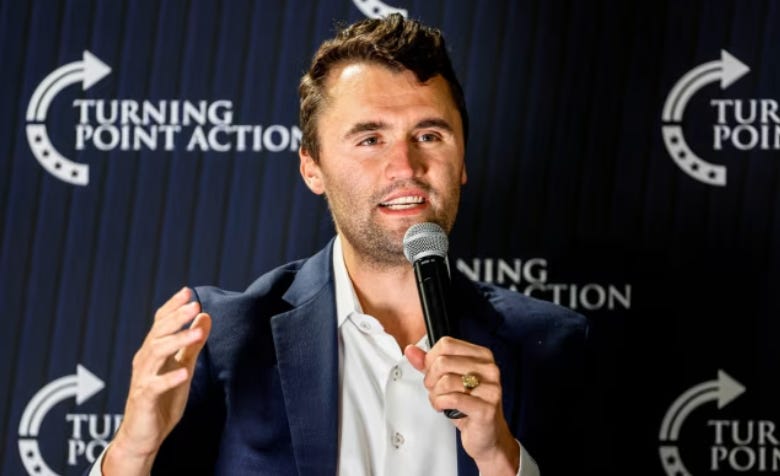Tributes to the Late Charlie Kirk
Charlie was a really good guy.
From Gerald Posner, who wrote a famous book on the JFK assassination, Case Closed.
@geraldposner
I participated in a debate at the Oxford Union just two weeks after Charlie Kirk had been there. When I asked Oxford students what they thought of him, it turned out that whether they loved or hated his politics, they ALL raved about him personally. He left a mark at Oxford for his accessibility and commitment that debate should bridge gaps, not make them wider.
From the author of the memoir Troubled:
Exactly two weeks ago, I met with Charlie Kirk.
Flew out to his studio in Phoenix. Turning Point USA had a whole compound with 6 buildings out there. I noticed the building with the main studio, where Charlie records his show, was one of two buildings that were unmarked. His assistant explained that this was for security reasons.
I met with multiple members of TP USA and was impressed with how young and energetic they were. They were organized and motivated and were clearly inspired by Charlie and his willingness to speak with anyone and everyone. He is one of the original inspirations for the "debate me bro" meme. Because he would literally debate anyone.
From seeing him on various podcasts, he struck me as a thoughtful guy but I didn't know what kind of interview to expect. The 1.5 hour long discussion with Charlie went extremely well. He was gracious, curious, quick on his feet, and asked probing questions. Right away I understood why he developed the following he had. He graciously put a copy of Troubled on his desk so that it could be visible to the audience throughout the interview. After we wrapped up, Charlie's team told me the interview would air sometime in September. At this point it is unlikely it will see the light of day.
News of his passing hit me harder than I expected. Our conversation lasted only an afternoon, but it left an impression. Charlie was gracious. Thoughtful. Willing to engage with anyone. In a time when many public figures play it safe, he courted risk and confrontation. Including jousting with the far-right groypers who would troll him at his events. His intellectual courage is why TP USA has become such a major force in American politics. Even if our interview never airs, I’m thankful I had the chance to sit down with him.
The fact that he was assassinated reveals just how dangerous it can be to forthrightly speak your mind in the public arena. Charlie’s life—and his death—will echo far beyond his own movement.
From Ross Douthat in the New York Times:
Conservatism on college campuses has traditionally mixed tweedy intellectualism, shock-value provocation and ruthless training for future G.O.P. operatives. All of these forms — and I say this with familiar affection — have tended to attract nerds and dorks and oddballs, campus outsiders, the inherently uncool.
Charlie Kirk, murdered on Wednesday talking to college kids at Utah Valley University, built his career and reputation organizing a different kind of campus conservatism — fun-loving, masculine, rowdy, mainstream, even faintly cool. He seemed like a guy who would be popular on campus, who would be invited to the good parties, who would have friends outside of political activism, who wouldn’t just show up in a bow tie plotting how to take over the Young Republicans. The fact that he was himself a college dropout, leaving college early to found Turning Point USA, was almost the perfect touch: There is nothing more normally American than choosing a really good entrepreneurial opportunity over the full undergraduate four years.
In this way, he was a harbinger and then an embodiment of Trump-era populism — a spokesman for a youthful right that seemed both more rebellious and more relaxed (like a good college hangout) as progressivism became more institutionally dominant and uptight, and that had a particular appeal to not-especially-ideological young men.
But Kirk didn’t abandon the nerdy-controversialist side of campus conservatism; he tried to embrace it and live it out, as well, showing up on his college tours ready to debate and argue publicly with anyone, liberal or far left or further right.
And what he argued for, in general, was not some extreme or esoteric form of right-wing politics. He wasn’t a school of one, a would-be philosopher of nationalism or a prophet of post-liberalism. He belonged to and maneuvered within the Trump-era conservatism mainstream, which meant he could be combative and pugilistic and say extreme things (this is 2025, after all) while remaining closer to a normal Republican voter than to the very-online vanguard.



I think that Democrats, as a demonstration of their commitment to free speech and to put their money where their mouths are with respect to condemning violence against those they disagree with, should start platforming the likes of Steve Sailer, Jared Taylor, Ron Unz, etc. Let them speak freely on CNN, NPR, PBS, MSNBC; make YouTubers and podcasters and such feel comfortable hosting them without fear of debanking or boycotts or whatever; etc.
Until they start recognizing and accepting these personae non gratae as civilized and intelligent men with differing opinions rather than Literally Hitlers Most Evil Men In The World, they're still guilty of encouraging, however subtly or not-so-subtly, this ongoing violence against dissident voices.
From the New York Yankees...
Before tonight's game we held a moment of silence in memoriam of Charlie Kirk.
Kirk founded the youth activist group “Turning Point USA” and had become a fixture on college campuses. Charlie Kirk, a husband and father of two children, was 31 years old.
https://x.com/Yankees/status/1965913114450501983
As an aside, the president will be attending tonight's game as it's the 24th anniversary of 9/11